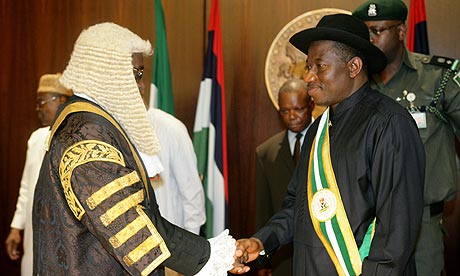
Photo courtesy of The New York Times
A New York Times article from May 21st explains the rise in a new trend in Nigerian culture- witchcraft. Many Nigerians practice witchcraft either as a separate religion or alongside another major religion. However, controversy has arisen from the fact that preachers like Helen Ukpabio (shown above) may be responsible for the harming and even deaths of toddlers and children who are supposedly "possessed". Ukpabio's movie "End of the Wicked" and her book "Unveiling the Mysteries of Witchcraft" both describe how the devil is capable possessing children, even going so far as to say “if a child under the age of 2 screams in the night, cries and is always feverish with deteriorating health, he or she is a servant of Satan.” This has unfortunately led to a large amount of exorcism and other methods of "removing spirits" and has left many children physically and emotionally hurt as well as abandoned. People like Gary Foxcroft, founder of the charity Stepping Stones Nigeria and the subject of the HBO documentary set to debut this week in America "Saving Africa’s Witch Children" in which he rescues children who have received "exorcisms", and Sam Itauma, founder of The Children’s Rights and Rehabilitation Network, which gives children affected by witchcraft a chance to receive education, now lead the fight to stop children from being hurt by witchcraft. After Saving Africa’s Witch Children was shown in the UK in 2008, Nigeria passed a law preventing children from being accused of witchcraft, but Ukpabio sued the government, essentially stating religion persecution. Although the lawsuit is still pending, the power of single people like Ukpabio in influencing people's actions shows a scary side to Nigeria's social scene.
This article is interesting for several reasons. First of all, the fact that some Nigerian people are allowing themselves to succomb to the power of one priest and her dangerous teachings over their common sense and rationale depicts a possible effect of having so many dictators- after having so many coups and shaky governments, people blindly follow what a single person says because that is what they have been used to in their lifetime. Second, there is a rural/urban cleavage present because a large amount of the people who follow priests like Ukpabio are located in the rural areas of Nigeria mostly due to a lack of education and access to proper religious organizations. Lastly, the practice of witchcraft as a religion shows another side of Nigeria's culture as well as how many Nigerian still honor the indigenous parts of their culture. After reading the article, it is apparent that something must be done to stop the spread of deeming children "Satanic" and then putting them through an exorcism. Not only is this practice cruel and inhumane, but the Nigerian people are sacrificing part of an generation to physical and emotional damage and thus a loss in potential minds and intelligence that could help in building up the country. Many rural families go bankrupt paying for these exorcisms and are unable to feed their families and maintain a life. The one positive side to this story is the fact that the Nigerian government has made efforts to curb the practice. Although Ukpabio's lawsuit countering the law may carry some weight in preventing the law from being fully implemented, the swift creation of the law shows a willingness on the Nigerian government's part to enact change in the country to benefit all citizens. The fact that the law was made after the documentary "Saving Africa’s Witch Children" was shown reveals that sometimes it takes the "entertainment" world to bring attention to an important cause.
Grade this post.













